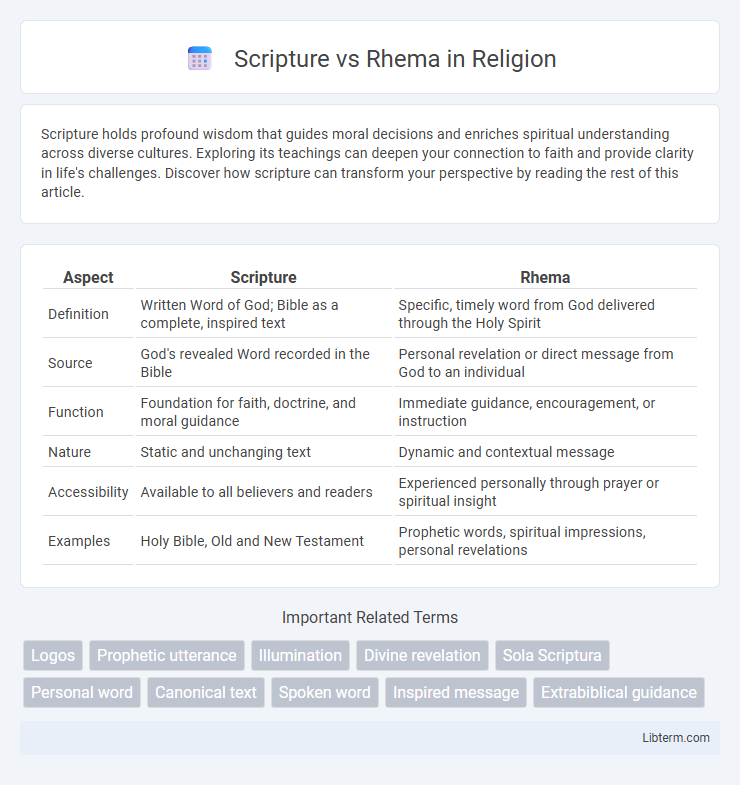Scripture holds profound wisdom that guides moral decisions and enriches spiritual understanding across diverse cultures. Exploring its teachings can deepen your connection to faith and provide clarity in life's challenges. Discover how scripture can transform your perspective by reading the rest of this article.
Table of Comparison
| Aspect | Scripture | Rhema |
|---|---|---|
| Definition | Written Word of God; Bible as a complete, inspired text | Specific, timely word from God delivered through the Holy Spirit |
| Source | God's revealed Word recorded in the Bible | Personal revelation or direct message from God to an individual |
| Function | Foundation for faith, doctrine, and moral guidance | Immediate guidance, encouragement, or instruction |
| Nature | Static and unchanging text | Dynamic and contextual message |
| Accessibility | Available to all believers and readers | Experienced personally through prayer or spiritual insight |
| Examples | Holy Bible, Old and New Testament | Prophetic words, spiritual impressions, personal revelations |
Understanding Scripture: The Written Word
Scripture, known as the written Word, refers to the Bible's complete and authoritative texts preserved across generations in original languages such as Hebrew, Aramaic, and Greek. Its foundational role encompasses doctrine, teaching, and inspiration, providing a fixed reference for faith and practice within Christianity. Understanding Scripture involves studying its historical context, literary genres, and theological themes to accurately interpret the intended message and apply timeless truths.
Defining Rhema: The Spoken Word
Rhema refers to the specific, spoken word or message delivered by the Holy Spirit to an individual, often bringing immediate revelation or guidance. Unlike Scripture, which encompasses the written Word of God in the Bible, Rhema manifests in a personal and timely manner, spoken directly into a believer's situation. This concept emphasizes the living and active dimension of God's communication, tailored for immediate application and response.
Historical Perspectives: Scripture and Rhema in Church Tradition
In church tradition, Scripture (the written Word of God) has been regarded as the foundational authority, while Rhema (the spoken or revealed Word) emphasizes personal, Spirit-led revelations. Early Church Fathers like Augustine acknowledged both dimensions, distinguishing Scripture as the objective text and Rhema as the subjective application or timely utterance by the Holy Spirit. Over centuries, this dynamic interplay shaped doctrinal development, balancing canonical texts with prophetic insight within various Christian traditions.
Key Differences Between Scripture and Rhema
Scripture refers to the written Word of God, encompassing the canonical texts of the Bible, while Rhema signifies the specific, personal revelation or spoken word from God to an individual. The key difference lies in Scripture's permanent, authoritative nature contrasted with Rhema's dynamic, situational application, often delivered through the Holy Spirit for guidance or encouragement. Understanding this distinction highlights how Scripture provides foundational truth, whereas Rhema offers immediate, relevant insight in a believer's life.
Theological Foundations: How Scripture and Rhema Interact
Scripture represents the written Word of God, embodying the complete and authoritative revelation, while Rhema signifies the specific, Spirit-inspired utterance or application of Scripture in a particular moment. Theological foundations emphasize that Scripture serves as the objective source, and Rhema acts as the subjective, personal encounter where the Holy Spirit brings the text to life for believers. Their interaction underscores a dynamic relationship whereby the eternal truths of Scripture are individually illuminated, guiding faith and practice in real-time contexts.
The Role of Scripture in Christian Life
Scripture serves as the foundational authority in Christian life, providing divinely inspired guidance and doctrinal truth essential for faith and practice. It functions as the written Word of God, revealing His character, promises, and commandments that shape believers' worldview and moral conduct. Christians rely on Scripture for spiritual growth, encouragement, and correction, ensuring alignment with God's will and deepening their relationship with Him.
The Function of Rhema in Spiritual Experience
Rhema functions as the dynamic, spoken word of God that activates faith and directs personal spiritual experiences, contrasting with Scripture's role as the written, authoritative Word. It serves to illuminate and apply biblical truths in real-time situations, providing immediate guidance and revelation specific to an individual's circumstances. This living expression of God's voice facilitates intimate communion and empowers believers with transformative insight during prayer, worship, and prophetic encounters.
Misinterpretations and Common Controversies
Misinterpretations of Scripture versus Rhema often arise from confusing the written text with the spoken or revealed word of God, leading to theological debates about authority and application. Common controversies focus on whether Rhema, as a personal and immediate revelation, holds equal or greater weight than the canonical Scripture, impacting doctrines and practical faith. This debate affects interpretations in charismatic and evangelical circles, where the balance between objective biblical truth and subjective spiritual experience remains contentious.
Practical Discernment: Testing Scripture and Rhema
Practical discernment in distinguishing Scripture from Rhema involves testing the inspired Word against the revealed or spoken word in specific contexts to ensure alignment with biblical truth. Scripture represents the foundational, written Word of God, while Rhema refers to a personalized, timely message or revelation derived from Scripture through the Holy Spirit. Effective testing requires prayerful meditation, comparing Rhema against established Scripture, and seeking confirmation through spiritual maturity and communal accountability to avoid misinterpretations or subjective impressions.
Balancing Scripture and Rhema for Spiritual Growth
Balancing Scripture and Rhema is essential for holistic spiritual growth, as Scripture provides the foundational truths and doctrines, while Rhema represents the personalized, timely revelations from God. Integrating both allows believers to anchor their faith in the unchanging Word of God and respond dynamically to His guidance in daily life. Cultivating this balance enhances discernment, deepens intimacy with God, and empowers effective ministry.
Scripture Infographic

 libterm.com
libterm.com